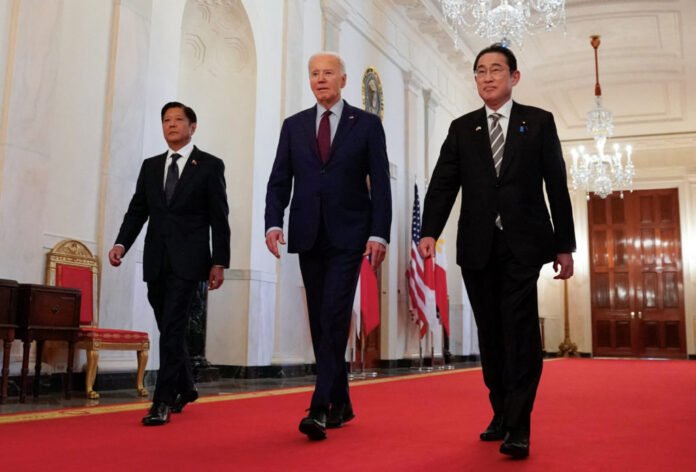WASHINGTON, United States — On Thursday, President Joe Biden reiterated that the United States will always stand behind Japan and the Philippines in the face of growing tensions with China. Amid mounting worries over Beijing’s assertiveness, a display of cooperation led to the first-ever combined summit with Tokyo and Manila.
Speaking at the White House alongside Japanese Prime Minister Fumio Kishida and President Ferdinand Marcos of the Philippines, Biden stressed the strength of the US defense commitment to its allies. “The United States has unwavering defense commitments to both Japan and the Philippines,” Biden asserted, emphasizing the seriousness of the issue.
Amidst the frequent encounters between Philippine and Chinese warships in the disputed South China Sea, fears of a bigger conflict were raised when the conference was called. Biden made it quite clear that the United States and the Philippines’ mutual defense treaty would be activated in the event of any action against Philippine military forces, ships, or aircraft in the area.
Tensions have been exacerbated by China’s progressively forceful claims over the great majority of the South China Sea, which ignore the claims of other countries in Southeast Asia, notably the Philippines. These events, together with Beijing’s rhetoric on Taiwan, have encouraged Biden to fortify his allies in the Asia-Pacific area.
The leaders of the United States, Japan, and the Philippines emphasized the importance of their alliance as a pillar of peace and democracy in the region during the historic summit that took place in the stately East Room of the White House. China was not mentioned specifically, but their alliance was presented as a stronghold against dictatorship.
President Marcos stressed their shared commitment to an international system based on rules and norms. Compared to his predecessor Rodrigo Duterte, Marcos was seen as being more in line with Washington. In line with this sentiment, Prime Minister Kishida emphasized the significance of multi-layered cooperation and described the conference as a historic event.
Discussions on security and defense were accompanied by items on the agenda pertaining to economic cooperation. In an effort to strengthen regional stability, the US, Japan, the Philippines, and Australia are scheduled to announce cooperative naval drills. China, however, reacted angrily, charging Tokyo and Washington with damaging China’s image during Kishida’s most recent state visit.
The US is trying to manage its relationship with China and reassure its friends in the middle of these geopolitical manoeuvres. The Biden administration has emphasized that it is committed to regional peace and stability and that its defense enhancements with Japan are defensive in nature rather than directed at any one country.




